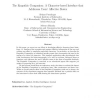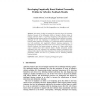9 search results - page 1 / 2 » The Impact of System Feedback on Learners' Affective and Phy... |
ITS
2010
Springer
13 years 9 months ago
2010
Springer
We investigate how positive, neutral and negative feedback responses from an Intelligent Tutoring System (ITS) influences learners‟ affect and physiology. AutoTutor, an ITS with ...
HCI
2009
13 years 2 months ago
2009
In this paper we take a closer and in-depth look at initial results obtained from a previous novel experiment conducted with a 3D subliminal teaching Intelligent Tutoring System. S...
AAI
2005
13 years 4 months ago
2005
In this paper, we report on our efforts in developing affective character-based interfaces, i.e. interfaces that recognize and measure affective information of the user and addres...
ITS
2010
Springer
13 years 9 months ago
2010
Springer
The impact of affect on learning has been the subject of increasing attention. Because of the differential effects of students’ affective states on learning outcomes, there is a ...
UMUAI
2008
13 years 4 months ago
2008
Abstract. Self-efficacy is an individual's belief about her ability to perform well in a given situation. Because selfefficacious students are effective learners, endowing int...


